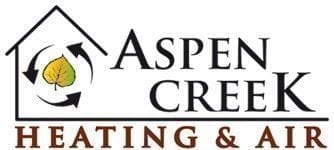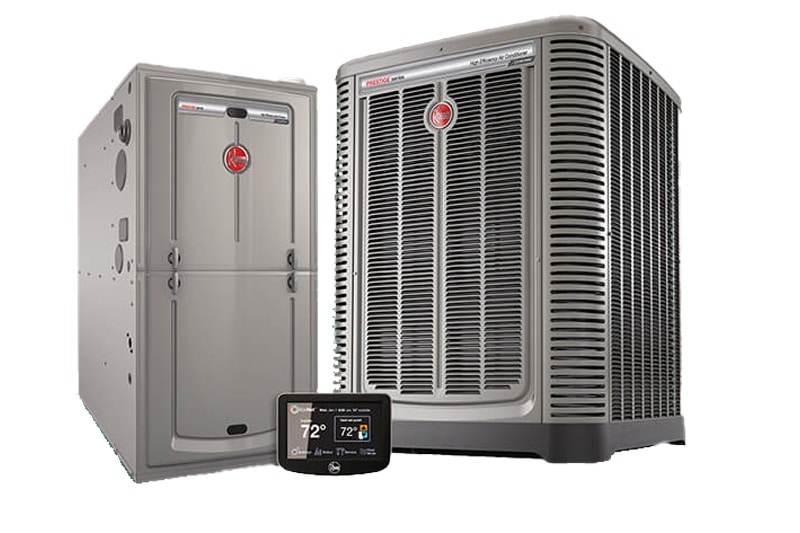You’re weighing AC vs heat pump: which is better for Denver? We get this question every week from homeowners and business owners in Lafayette, Broomfield, Superior, Louisville, and across the North Metro. The short answer: a modern heat pump often wins for all‑electric, year‑round comfort and efficiency. But an AC with a gas furnace can still be the right call in some cases. Below, we explain how each system works here along the Front Range, what it costs to run, and how to choose. We also cover rebates from Xcel Energy and federal credits. And if you want straight advice for your home, Aspen Creek Heating and Air is local, honest, and here to help.
Key Takeaways
- In Denver’s climate, a modern cold-climate heat pump often wins the AC vs heat pump debate for all-electric, year-round comfort and efficiency.
- If you’re comparing AC vs heat pump for Denver on budget alone, a new AC makes sense when your gas furnace is newer and efficient.
- Heat pumps stay highly efficient above about 30–35°F, and a dual-fuel setup with a smart balance point handles deep freezes while controlling costs.
- Xcel Energy rebates plus the federal 25C tax credit (up to 30% capped at $2,000) can significantly cut heat pump upfront costs.
- Variable-speed heat pumps run quieter and keep steadier temps with less winter dryness, while cooling performance is a tie in Denver’s dry summers.
- For Denver installs, confirm duct airflow and electrical capacity, place outdoor units above snow lines, and ensure permits and inspections are included.
How Each System Works and What That Means in Denver
- Air conditioner (AC): It cools only. It moves heat from inside to outside. For heat, you still need a separate furnace.
- Heat pump: It both cools and heats. In summer, it works like an AC. In winter, it reverses and brings heat in from outside air.
What this means for Denver and the surrounding cities:
- AC + furnace is a two‑appliance setup. It’s common in Lafayette, Broomfield, and Louisville. It’s simple if you already have gas service and like your current furnace.
- A heat pump is one electric system for both seasons. New cold‑climate models hold strong in freezing temps. On the coldest nights, many homes still use backup heat (electric strips or a gas furnace in a dual‑fuel setup).
Climate Realities Along the Front Range
We have hot, dry summers and sunny, variable winters. Denver swings from 60° afternoons to sudden cold snaps. In Superior and Louisville, you’ll see plenty of days in the 20s and 30s, with some dips near or below 0°F.
What matters:
- Cooling: Both ACs and heat pumps handle our dry heat well.
- Heating: Heat pumps are very efficient above ~30–35°F. Efficiency drops as temperatures fall, but modern cold‑climate units can still heat below 0°F. A smart balance point or backup improves comfort.
- Dry air: Gas furnaces can dry indoor air. Heat pumps tend to maintain more even humidity. That’s a small comfort boost for many homes in Lafayette and Broomfield.
Upfront and Operating Costs
Upfront cost:
- AC replacement only: Usually the lowest initial price if you’re keeping a working gas furnace.
- Heat pump: Higher upfront than AC alone. Similar to replacing both AC and furnace together, depending on model and duct work.
Operating cost:
- Cooling: AC and heat pump costs are similar for the same efficiency rating.
- Heating: Heat pumps can lower annual bills if you’re replacing electric resistance heat or an old, inefficient furnace. If you have an efficient gas furnace and low gas rates, the savings may be smaller.
Incentives:
- Xcel Energy often offers rebates for qualifying heat pumps and cold‑climate models. Amounts vary by equipment and home setup.
- Federal tax credit (25C) may provide up to 30% of project cost, capped at $2,000 for eligible heat pumps each year. Check the latest IRS rules.
Bottom line in our area:
- Many Lafayette and Broomfield homeowners see strong value with a heat pump if they want to cut gas use, replace aging systems, or take advantage of rebates.
- If budget is tight and your furnace is newer, an AC replacement can make sense now, with a plan to switch later.
Comfort, Performance, and Cold-Weather Capabilities
Cooling comfort:
- Tie. Both systems cool well in our dry summers, especially in Westminster and Arvada where afternoon temps jump quickly.
Heating comfort:
- Heat pumps shine in the shoulder seasons. They deliver steady, even heat without hot blasts or big swings.
- Below freezing, a cold‑climate heat pump still performs, but it works harder. A dual‑fuel setup uses the gas furnace on the very coldest nights for faster, warmer supply air.
Noise and indoor feel:
- Variable‑speed heat pumps run quietly and keep rooms more consistent. Fewer temperature spikes. Less dryness. Many clients in Louisville mention their home just “feels” better.
Control:
- Smart thermostats with outdoor sensors can switch between heat pump and furnace at the best balance point. We set this up often in Superior and Lafayette homes.
Environmental Impact and Energy Sources
- Heat pumps run on electricity and don’t burn fuel on site. As the grid gets cleaner, your home’s carbon footprint drops too.
- AC + gas furnace uses electricity for cooling and natural gas for heat. Gas has higher direct emissions.
- If your goal is to reduce carbon and future‑proof your home in Boulder or Broomfield, a heat pump is usually the better path. Add an efficient backup and air sealing to amplify the impact.
Choosing What Fits Your Home
Every building is different. Age, insulation, duct sizes, and utility rates all matter. Here’s how we guide the choice for homes and small businesses in Lafayette, Broomfield, Superior, Louisville, and beyond.
When an AC Makes More Sense
- You have a newer, high‑efficiency gas furnace you like.
- You need the lowest upfront cost now.
- You prefer strong, high‑temperature supply air during rare deep freezes.
- Your ducts were designed around a furnace airflow profile and need no changes.
When a Heat Pump Makes More Sense
- You want one system for year‑round comfort.
- You’re replacing electric baseboards or an old, low‑efficiency furnace.
- You want to cut gas use and take rebates or federal tax credits.
- You plan to add solar or you value a smaller carbon footprint.
- You want steadier temperatures and less dryness in winter.
Consider a Hybrid (Dual-Fuel) Setup
- Pair a heat pump with your existing or new gas furnace.
- Use the heat pump for most days. Let the furnace take over at a set outdoor temperature (the balance point).
- This gives top comfort, strong cold‑weather performance, and lower operating costs. It’s our most common choice for families in Louisville and Superior who want efficiency without giving up that toasty furnace feel at 0°F.
If you’re unsure, we can model your energy use and run a cost comparison. Aspen Creek Heating and Air does this often during estimates so you see real numbers, not guesses.
Installation Considerations for Denver Homes
Timeline:
- Most replacements take 1–2 days. Larger projects can take 3 days.
Ductwork and electrical:
- Heat pumps may need airflow tuning or small duct changes. We also check electrical capacity for outdoor units and any auxiliary heat.
Outdoor placement:
- We set the condenser on a proper pad above snow lines and away from drifting. In Broomfield and Lafayette, wind direction matters. We think about service access and noise for neighbors.
Permits and code:
- We pull permits and follow local codes and manufacturer specs. That protects warranties and resale value.
Maintenance, Lifespan, and Reliability
- Annual service keeps both systems efficient and quiet. Filters matter. So does a clean outdoor coil.
- Heat pumps run year‑round, so they work more hours than an AC. With regular maintenance, life expectancy is still solid.
- A dual system shares the load. That can extend life for both the heat pump and the furnace.
- We offer maintenance plans for homes and businesses in Lafayette, Superior, Louisville, and Broomfield. Aspen Creek Heating and Air services all brands.
Local Incentives, Codes, and What to Ask an Installer
Incentives:
- Ask about Xcel Energy rebates for heat pumps, cold‑climate models, and smart thermostats. Amounts can change, so we check current programs for you.
- Federal tax credit 25C may cover 30% of costs up to $2,000 for qualifying heat pumps each year.
What to ask:
- Are you trained on cold‑climate heat pumps?
- Will you confirm the balance point and dual‑fuel controls?
- Do my ducts support the needed airflow?
- What’s the total installed cost after rebates and credits?
- How will you size the system? (We use Manual J/S/D, not rules of thumb.)
Codes and permitting:
- Denver Metro cities, including Lafayette, Broomfield, Superior, and Louisville, require permits and inspections for HVAC replacements. Aspen Creek Heating and Air handles this. We make it simple.
Conclusion
So, AC vs heat pump: which is better for Denver? If you want one system, lower long‑term energy use, and access to rebates, go heat pump. If your gas furnace is newer and budget rules the day, an AC replacement is fine. For many homes in Lafayette, Broomfield, Superior, and Louisville, a dual‑fuel setup is the sweet spot.
If you’d like a clear, line‑by‑line estimate and a comfort plan that fits your home, we’re ready. Aspen Creek Heating and Air is based in Lafayette and serves the entire North Metro. We’re neighbors, and we stand behind our work. Call Aspen Creek Heating & Air for straight answers and a clean install the first time.
Denver HVAC FAQs: AC vs. Heat Pump
AC vs heat pump: which is better for Denver homes?
For most Denver-area homes, a modern heat pump is better for all‑electric, year‑round comfort, lower long‑term energy use, and rebates. If your gas furnace is newer and budget is tight, replacing just the AC makes sense. Many homes find a dual‑fuel setup the ideal balance of comfort and cold‑weather performance.
Do heat pumps work well in Denver’s winters and cold snaps?
Yes. Cold‑climate heat pumps heat efficiently above about 30–35°F and can still perform below 0°F. Using a smart “balance point” with backup heat—electric strips or a gas furnace in a dual‑fuel system—keeps comfort high during rare deep freezes common along the Front Range.
What’s the cost difference of AC vs heat pump in Denver, and are there rebates?
An AC-only replacement usually has the lowest upfront cost. A heat pump costs more than an AC alone but is similar to replacing both AC and furnace together. Operating costs are similar for cooling; heating can be cheaper with heat pumps depending on gas rates. Xcel Energy rebates and the federal 25C tax credit (up to $2,000) often reduce heat pump costs.
What is a dual‑fuel heat pump system, and when should Denver homeowners choose it?
Dual‑fuel pairs a heat pump with a gas furnace. The heat pump handles most days; the furnace takes over at a set outdoor temperature for toasty air during deep cold. It’s popular locally for top comfort, strong sub‑freezing performance, and lower operating costs without fully giving up natural gas.
How long do heat pumps and AC systems last in Denver’s climate?
With annual maintenance, central AC units typically last 12–15 years. Heat pumps run year‑round, so expect about 12–15 years as well; variable‑speed models can remain reliable when serviced regularly. In dual‑fuel setups, the load is shared, which can extend the life of both the heat pump and the furnace.
What efficiency ratings (SEER2/HSPF2) should I look for in Denver?
For Denver’s hot‑dry summers and variable winters, target at least SEER2 15–17 for cooling efficiency and HSPF2 8.1+ for heat pumps. Cold‑climate models with higher HSPF2 and strong low‑temp capacity are ideal. Balance higher efficiency with utility rebates, installation quality, and proper sizing (Manual J/S/D) for the best real‑world performance.

